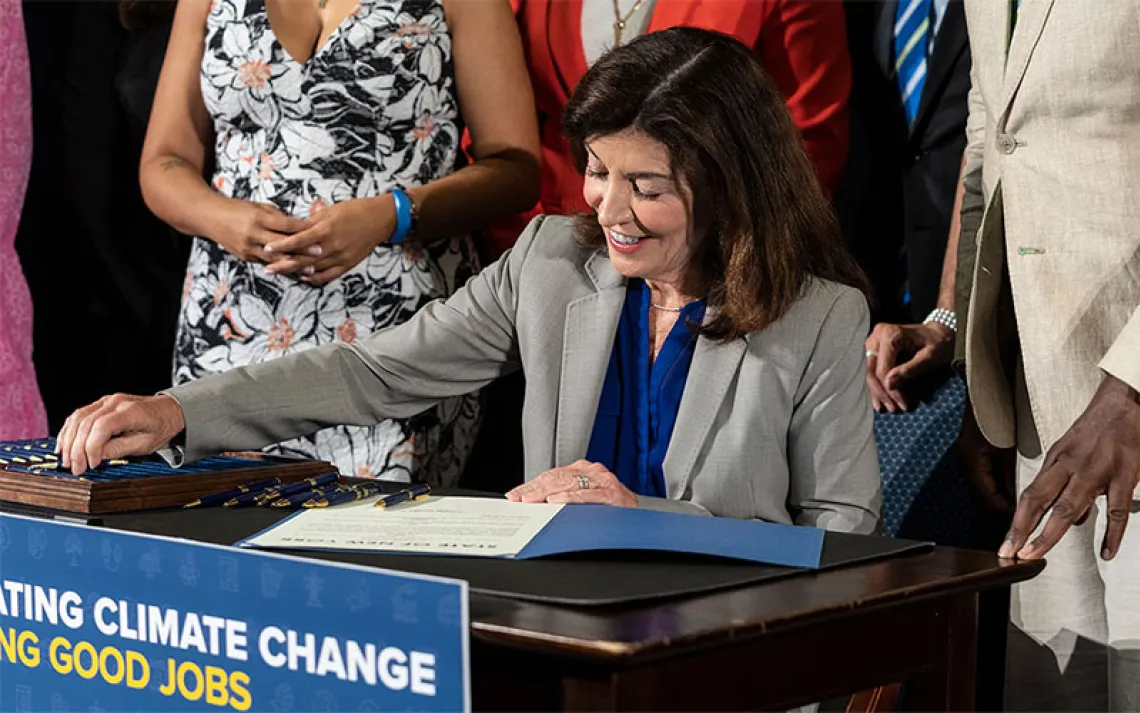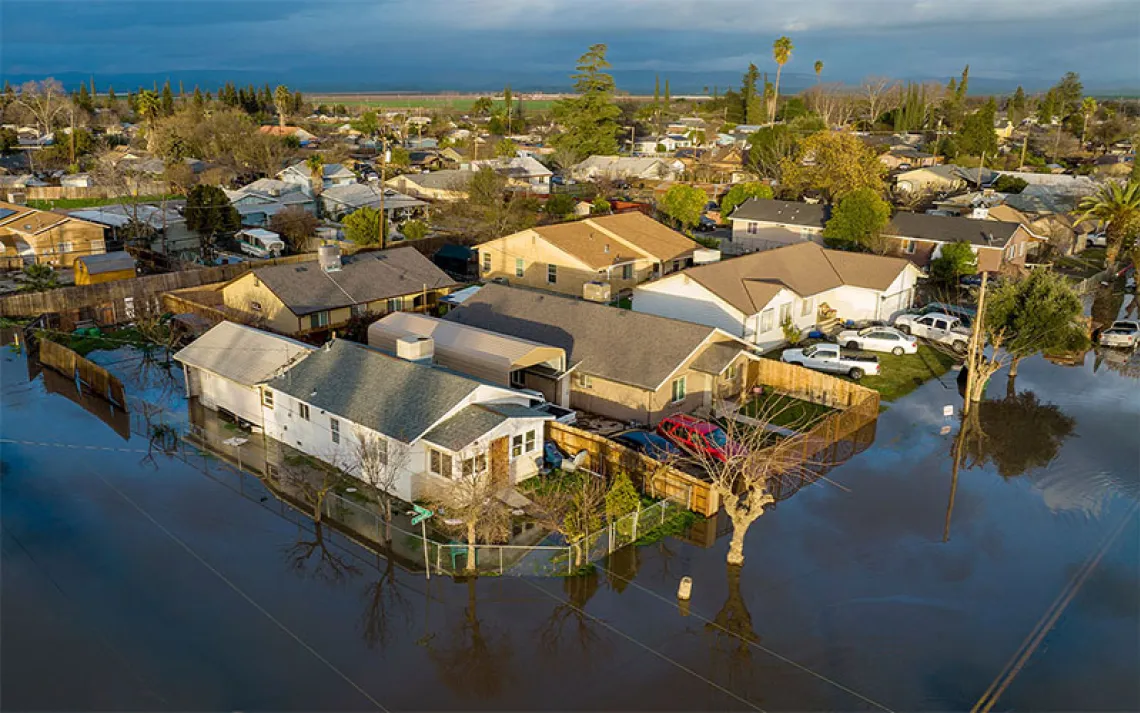For a New Generation of College Students, Climate Change Isn’t Political. It’s a Lived Reality.
But when it comes to how to respond to the crisis, the debate goes on

Students protest the climate emergency in Foley Square in New York City on December 6, 2019. | Photo by Gabriele Holtermann-Gorden/Sipa USA via AP
Last June, an unprecedented heat dome descended upon the Pacific Northwest, smashing all-time temperature records in cities from California to Washington. In Seattle, temperatures soared to 108 degrees on June 28, the highest reading ever recorded there since 1948, breaking the previous record of 104. It was one of three consecutive days in the triple digits in a city poorly equipped to handle extreme heat—a Seattle Times study in 2018 found that the city is the least air-conditioned metro area in the nation.
Liv Schroeder had just graduated from high school and was still living in Seattle, preparing to move to Claremont, California, for her freshman year at Pitzer College when the heat wave struck.
“I have a chronic kidney illness, which makes me prone to be dehydrated,” she told Sierra. “I had to stay inside my house for two weeks during that heat wave to protect myself.”
Now living in Claremont, Schroeder, the national policy coordinator for Fridays for Future USA, is organizing student activists across the country for a global strike on September 24 in response to the climate crisis and to demand concrete policymaking from global leaders who will be gathering in November at the United Nations COP26 climate conference in Glasgow.
“Our core demand is access and representation,” she says, “and to uproot the system. Young people are angry. We watch the COP conferences every year, and every year you see Shell and Exxon CEOs sitting on panels. And you see youth activists being tokenized and brought to these conferences for photo ops. Our community is so often excluded from these conversations in which all these huge decisions that directly impact us are happening. It feels like we’re watching the world burn while we’re locked out of the conversation over what to do about it.”
Fridays for Future, which formed in 2018 after Greta Thunberg began her daily strike in front of the Swedish parliament, is one of the best-known youth-led climate movements in the world. It is not a registered nonprofit organization but rather a decentralized international collective of youth activists in countries across the globe who, like Schroeder, have often experienced the climate crisis firsthand. "It’s incredible to get to know young people who are fighting for the same thing you are and who live oceans away,” she says. “Many of these are what we call MAPA activists, for Most Affected People and Areas by the climate emergency. We are young people trying to figure out not only what we want to do with our lives, but how to make concrete action on climate happen.”

Now is the time for environmental journalism.
Sign up for your Sierra magazine subscription.
With this action you affirm you want to receive Sierra Club communications and may vote on policy designated by the Sierra Club Board.
For a new generation of college students, that story is no longer reserved for those who identify as politically liberal or left-of-center. As the climate crisis becomes a lived experience for more young people nationwide, many students, regardless of their political views, want action—even those who identify as conservative, Republican, or both.
Hurricane Ike struck the state of Texas in September 2008 as a powerful Category 2 storm with sustained winds of 110 miles per hour. It flattened homes in Galveston, Houston, and surrounding areas, leveling entire buildings and crippling businesses, and left nearly 100 people dead. Over 100,000 homes were flooded, and more than 3 million people lost power. Galveston Island was hit with the highest storm surge ever recorded there. At the time, it was one of the deadliest and most expensive storms in US history, costing an estimated $34.8 billion.
Stephen Perkins was 13 and living just north of Houston, in Spring, Texas, at the time.
“I was young, and my mother was undergoing cancer treatment and on oxygen,” Perkins told Sierra. “It was a very scary time. We were afraid of what would happen to her if we lost power.”
Ike was just one of four major hurricanes Perkins personally experienced while growing up in Texas. “I was able to see how these storms not only disrupt local communities but how they destroy people’s lives,” he says. “I grew up going to school with a lot of people who were permanently relocated from New Orleans after Hurricane Katrina. I’ve seen the effects of climate change in my local community. I’ve seen the personal loss that it causes people.”
Perkins is one of a growing number of young conservatives for whom the debate over whether global warming is real and human-made has been settled. Today, he works to get college students engaged as the vice president of grassroots strategy for the American Conservation Coalition, one of the largest politically conservative youth-led climate action organizations in the United States.
ACC was formed in 2017 for college conservatives who care about the environment and were concerned about climate change but didn’t have a forum in which to engage on the issue, or to have a conversation about whether there are solutions that are compatible with their conservative principles. ACC does not consider itself a Republican organization but rather a right-of-center nonprofit acting under its own umbrella of like-minded conservatives who care about the environment. ACC is now active in 100 communities across the county, many at universities.
During its national nominating convention last year, the Republican party rolled over its platform from 2016, and the environment wasn’t even mentioned. ACC conducted a social media campaign hashtagged #WhatAboutClimate to push the RNC to put forward a plan to tackle climate change. “When we started four years ago, even mentioning climate change in a conservative circle was tricky,” Perkins notes. “But now, especially with younger conservatives, it’s not a taboo issue.”
Perkins says that he rarely meets conservative college students who don’t believe global warming is real or human-made. Not so with the older generation, however. “It’s generally something we run into with elected officials or people in a policy or government type of role,” he says. “But we have the data to back us up. We remind them that if they are still trying to have that debate now, they are on the losing side. Young voters are not interested in having a debate about whether climate change is real, because they see that it’s happening every day.”
New poll numbers bear this out. According to an April 2021 Gallup poll, 74 percent of Republicans believe that global warming will eventually affect humans, with 70 percent of college graduates more likely to believe that the effects of global warming have already begun.
Bob Inglis is the former Republican US representative for South Carolina's 4th congressional district and now the executive director of republicEn, a self-described “EcoRight” organization that engages youth and other conservative groups on climate change and how to align climate action with the principles of free enterprise.
“College republicans are the most effective ambassadors to their parents and grandparents,” Inglis told Sierra. “One of the reasons conservatives don’t take action on climate is solution aversion. Conservatives hear this story that godless scientists are going to come regulate their very breath. We have to communicate to them that climate solutions can be grounded in rock-solid conservative principles such as free enterprise.”
The debate over whether climate change is a human-made crisis may be largely over between college-age conservatives and progressives, but not so the debate over how to address it. For college conservatives like members of ACC, the answer lies in harnessing the current system of capitalism and free markets to advance solutions to climate change, along with more traditional conservation programs. Its new Rooted in America campaign promotes natural climate solutions such as planting trees and sustainable agriculture. The organization is also offering a series of online courses under its Market Environmentalism Academy to educate young activists on how free-market principles can connect with climate action.
“We recognize the importance of clean energy and focusing on conservation work and educating young activists that planting trees is a form of climate action,” Karly Matthews, ACC’s communications director, told Sierra. “Without a plan, young conservatives feel disenfranchised. They say they belong to a party that doesn’t prioritize an issue that’s really important to them.”
This free-market approach to global warming is where ACC and progressive green groups part ways. Its central platform, for example, the American Climate Contract, supports greater investment in nuclear power, a solution most green groups firmly reject because of its highly radioactive nuclear waste (the United States is currently home to over 90,000 metric tons of spent nuclear fuel, with no clear plan for how to dispose of it). And the contract does not address the ways in which capitalism and free markets have traditionally exploited frontline communities.
For Schroeder and Fridays for Future USA, the existing system of free markets and unregulated capitalism is the root of the problem and needs to be fundamentally reworked to effectively address climate change. The Fridays for Future USA platform calls for holding “wealthy former colonial powers accountable for perpetrating destruction” and investing “in social justice movements that decolonize and deindustrialize, as well as climate solutions that center overexploited nations.”
“When we talk about the system, we have to recognize that the United States has a long history of exploiting other countries,” she says. “The US is the world’s second-largest polluter. You can’t pollute, extract, and exploit other countries for centuries and then put forward climate solutions that only work for the Global North. You have to consider, how do we get climate justice to these countries that have been overexploited? How do we figure out a global system that works for everyone while assigning responsibility appropriately?”
Schroeder and other Friday for Future activists have put forth a set of policy demands and corresponding principles in conjunction with the September 24 climate strike. These include—in addition to #UprootTheSystem, which is the umbrella hashtag campaign for Fridays for Future’s September 24 strike—“Take Action to Science” and “Reinvest in Communities.” The group offers resources to help young activists get involved, from striking to joining social media campaigns to joining an organizing team.
Despite their policy differences, youth-led student movements like Fridays for Future and the American Conservation Coalition share a common understanding of basic facts: The climate crisis is real, it’s human-made, and we must take action now to save the planet. In a country where consensus around facts can be rare, at a time when ecosystems of misinformation actively shape public perception about politics and science, this represents progress of sorts.
Schroeder says now is the time to take action, regardless of your views or background.
“Anyone can be an activist,” she says. “Whatever your special talent is, whatever you are passionate about, whatever you want to contribute and are eager to contribute. Climate justice doesn’t just mean organizing for wildlife and the environment. At the end of the day, it’s our love for people and communities. That’s why we do this work.”
 The Magazine of The Sierra Club
The Magazine of The Sierra Club



